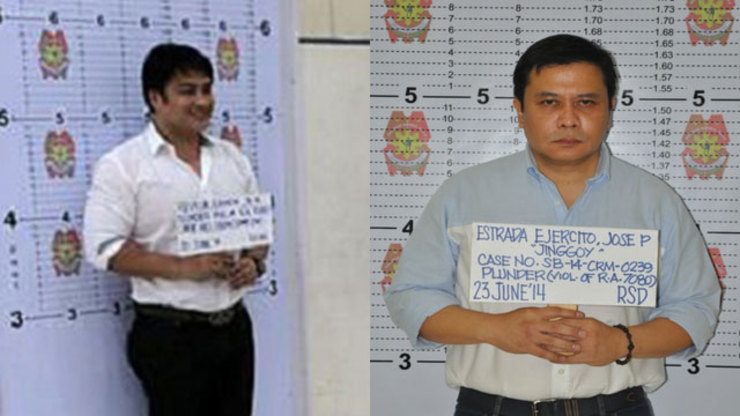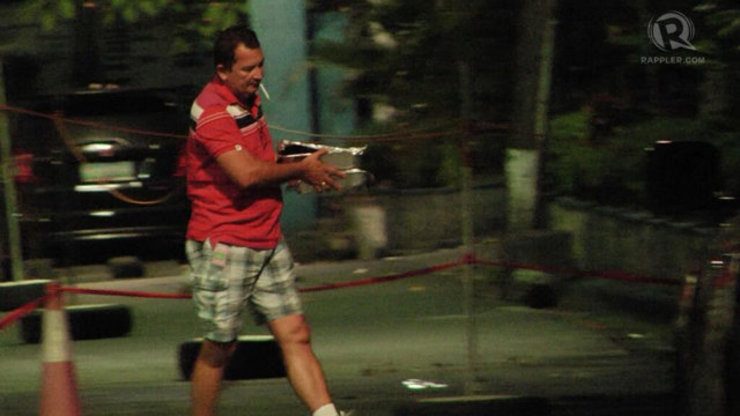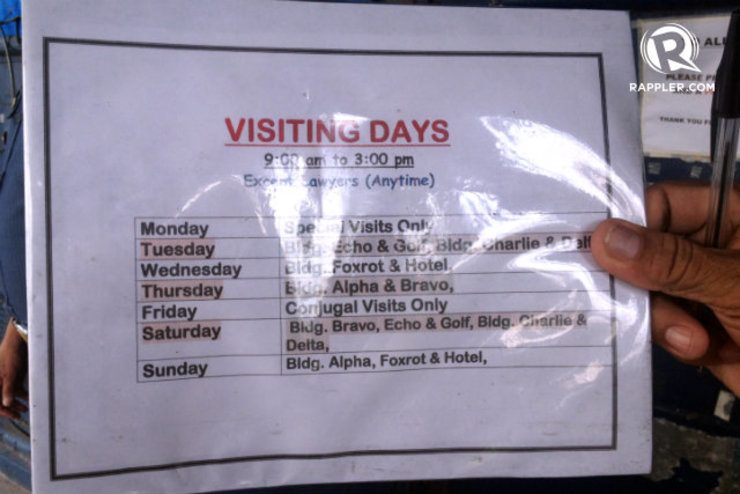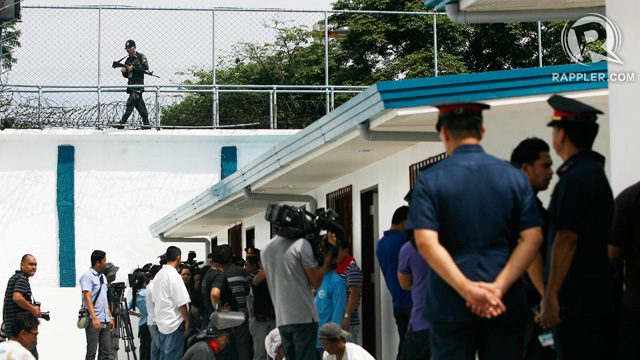SUMMARY
This is AI generated summarization, which may have errors. For context, always refer to the full article.

MANILA, Philippines – Senators Bong Revilla and Jinggoy Estrada, currently jailed at the Philippine National Police (PNP) Custodial Center in Camp Crame, Quezon City, aren’t your typical detainees.
They await trial inside newly-renovated rooms designed to be the quarters of policemen stationed at the custodial center, instead of in camp quarters. (IN PHOTOS: Senators’ detention center in Camp Crame)
They’re watched over by police men 24/7, but they aren’t required to wear handcuffs or jail uniforms whenever they’re whisked off to court for hearings.
They’re away from their families and legion of supporters but that doesn’t seem to matter too much. According to journalists who’ve camped out outside the custodial center, visitors – family and friends – are free to enter and leave the detention center way beyond assigned visiting hours.

Jail food doesn’t even seem to be an issue for the two, since their visitors bring them food from outside: an entire roasted pig, Chinese takeout, and trays upon trays of other food items.
This, after and despite the PNP’s assurance that no special treatment would be given to the high-profile detainees.
Visiting rules
Estrada and Revilla’s situation is a far cry from the rest of the country’s detainees – including those at the PNP Custodial Center.
Following rules set by the Bureau of Jail Management and Penology (BJMP), which runs the country’s jails, only lawyers, spiritual advisers, and medical professionals are allowed access to a detainee at all times outside visiting hours.
The PNP was lax in imposing visiting hours during the two senators’ first few days in detention, to give them time to “adjust” to life in detention.
Journalists camped outside the Custodial Center, however, said Estrada and Revilla’s visitors seem to come and go as they please even after the “grace period.” Some visitors, according to media reports, entered the Custodial Center on Saturday, June 28, and left in the wee hours of the morning the next day, on Sunday, June 29.

Detainees in the custodial center are allowed up to 4 visiting windows a week – 2 “regular” visits, one conjugal visit and one “special visit.” Estrada and Revilla are only allowed “regular” visitors every Thursday and Sunday, from 9 am to 3 pm.
No explanation has been given to media regarding the violation of visiting hours, except for Estrada’s visitors on the 28th. PNP spokesman Chief Superintendent Reuben Theodore Sindac said it was a request from Estrada in light of his 25th wedding anniversary.
Up to 30 people are allowed to visit the “special” compound at a time. Sindac said the limit is due to the size of the detention center.
It doesn’t matter how many visitors each senator has, so long as not more than 30 people are inside the center at a time.
Sindac said the PNP has already ordered the custodial center chief to explain the violation of visiting hours. He said the report might be ready by Wednesday, July 2.
The breaking of rules came as a surprise to the Palace. “Certainly, we were surprised that the visitation rules were not followed because [Sindac] informed the public that there are visitation rules,” said Palace spokesman Secretary Edwin Lacierda in a press briefing on Monday, June 30.
“Kung may rules, that should be applied, dapat i-apply. At bakit nagkaroon ng—tila nagkaroon ng exception kahapon? Kaya nga kailangang imbestigahan ‘yung nangyari kahapon at malalaman niyo po sa resulta ng investigation,” he added.
(If there are rules, they should be followed. It seems as though there was an exception yesterday [Sunday]. That’s why we need to find out what happened.)
‘No flight risk’
What makes Estrada and Revilla distinct from most detainees is their surrender, said Sindac. It’s also why they aren’t handcuffed or required to wear a jail uniform when brought out of the custodial center to attend their arraignment at the Sandiganbayan.
Both senators faced the anti-graft courts in Barong Tagalogs.
The same courtesy was extended to former PNP chief Avelino Razon Jr during his arraignment for graft and malversation charges before the Sandiganbayan. Razon was the PNP chief from 2007 to 2008. (READ: Razon’s jail is his former kingdom)
The former PNP chief also surrendered to the Sandiganbayan.
A surrender, said Sindac, means it’s highly unlikely a detainee will attempt an escape. Reacting to groups comparing the “special treatment” of the senators and the “mistreatment” of Andrea Rosal, the daughter of late New People’s Army spokesman Gregorio Rosal.
Rosal’s detention drew outcry from various groups when her baby Diona Andrea Rosal died 2 days after her birth. Sindac explained that Rosal was considered a flight risk, since she was nabbed by authorities and is considered to be part of an insurgent group. (READ: Prison reform: The only unity we need)
Not PNP’s competency
In a Monday, June 30 press conference, Department of the Interior and Local Government (DILG) Secretary Mar Roxas said the PNP was following rules set by the BJMP.

Both Roxas and PNP are first to admit – handling a detention center is not the PNP’s core competency. It’s one of the many reasons why the Custodial Center is designed to be a temporary holding facility.
But in reality, it’s anything but temporary.
Many of the accused in the center have been staying there for years. Legal experts believe the plunder and graft hearings will stretch on for years and years, likely exceeding the terms of President Benigno Aquino III and his successors. – Rappler.com
Add a comment
How does this make you feel?
There are no comments yet. Add your comment to start the conversation.